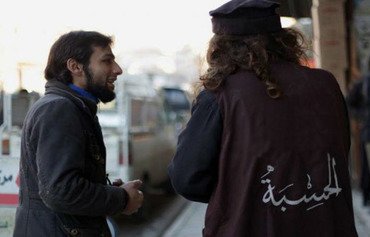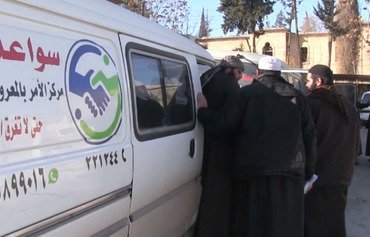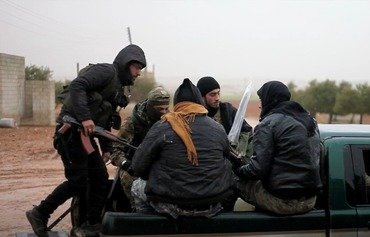Tahrir al-Sham has reactivated its al-hesba ("religious police") apparatus in Idlib, imposing a list of rules and prohibited activities that restrict the freedoms of civilians and enable it to crack down on its opponents, a Syrian activist said.
The move sparked a wave of anger among residents of the Idlib region who live in areas controlled by the extremist alliance, said Idlib activist Musab Assaf.
Tahrir al-Sham had previously deployed al-hesba teams -- known as Sawaed al-Khair -- in the Idlib region, but they were deeply unpopular with the local population and the group eventually stopped using them, he told Diyaruna.
Now they have been brought back under the name of "Al-Falah Centre for the Promotion of Virtue and the Prevention of Vice", he said, and have begun to conduct patrols in the province's streets and neighbourhoods.
![Tahrir al-Sham elements attend a religious class in Syria's Idlib region. [Photo via Shoot an Arrow with Them campaign]](/cnmi_di/images/2020/05/14/24053-Tahrir-Sham-religion-600_384.jpg)
Tahrir al-Sham elements attend a religious class in Syria's Idlib region. [Photo via Shoot an Arrow with Them campaign]
"The current and former al-hesba elements are the same people," he noted, describing them as "hardline Tahrir al-Sham elements of various nationalities who are known for their fanaticism and intolerance".
They had previously gained a reputation for terrorising residents with beatings, floggings and arbitrary detentions, Assaf said.
Residents chafe at restrictions
Tahrir al-Sham circulated a list of prohibited activities that will be enforced by its newly reactivated al-hesba teams, who will actively pursue violators, he said.
The list of forbidden activities includes a total ban on the mixing of sexes, especially in restaurants and offices, as well as a ban on the presence of male sales attendants in women's stores, and vice versa.
Women are prohibited from entering a store with a man present unless accompanied by a mahram (male guardian).
Other banned activities include "smoking shisha in public, the mixing of students in schools, colleges and universities, and the use of photographs and posters in shops".
Youth also will be held to account for the way they cut their hair.
Assaf said civilians in Idlib refuse to co-operate with Tahrir al-Sham's al-hesba teams, as they see them as imposing restrictions on their personal freedoms.
They also believe the extremist alliance is using the apparatus to crack down on those who object to its actions, which is beyond the scope of its stated purpose.
In recent weeks, Assaf said, Tahrir al-Sham has stepped up its visibility in the region by conducting additional promotional activities and religious classes for its elements and for local youth.
This is part of an attempt to reassert its presence and control in the region, in response to the growing number of popular protests against the policy it is implementing in the Idlib area, he said.

![A vehicle belonging to Tahrir al-Sham's newly reactivated al-hesba apparatus patrols in north-western Syria. [Photo courtesy of Southern Rural Aleppo News Observatory]](/cnmi_di/images/2020/05/14/24052-Tahrir-Sham-hesba-600_384.jpg)






